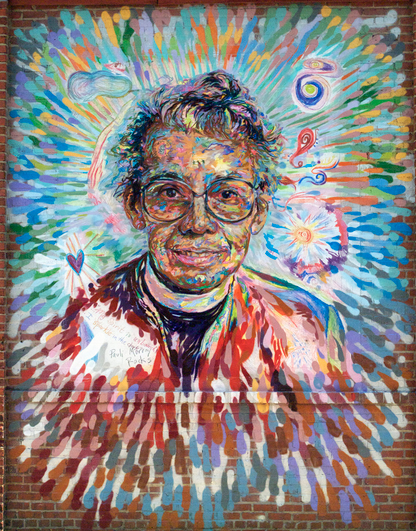by Guest Feature Editor Dwight Tanner

The start of June—Pride Month in the U.S.—is the perfect time to officially launch NCLR’s 2025 special feature exploring the rich and diverse range of LGBTQ+ literature and writers from North Carolina. And I am delighted to have been asked to guest-edit this special feature.
The roots of Pride can most obviously be traced back to the Stonewall Riots, when police raided the Stonewall Inn during the early morning hours of June 28, 1969. While raids on gay bars in NYC were routine at the time, the Stonewall patrons on this particular night—led largely by lesbian and transgender women of color such as Stormé DeLarverie and Slyvia Rivera (both of whose contributions for decades were erased)—refused to comply with police. The subsequent early morning events led to a series of demonstrations and clashes with law enforcement that lasted for days, ultimately spurring the modern gay rights movement in the United States.
The history of Pride celebrations is–not unlike the wide-range of queer NC voices–multi-layered, intricate, and often underexplored. The first Pride-like event, then called the Christopher Street Celebration Day after the street where Stonewall is located, was an organized march in NYC, Chicago, and Los Angeles that occurred one year after the riots, in 1970. These gatherings, which were adapted from the “Reminder Day Pickets” that had started in 1965, married queer-rights activism, community building, and a celebration of/insistence on being and belonging.
While we often prefer simplified histories, the origins of modern Pride are a complicated patchwork of largely forgotten prior events, established organizations (such as ERCHO, who organized the first “Reminder Day Pickets”), and activist causes that played out across a range of locales, both nationally and globally.
For example, here in North Carolina, the first NC Pride event is sometimes cited as stemming from the protest/vigil that took place on April 17, 1981, outside the Durham County Courthouse after the brutal attack on Ronald “Sonny” Antonevitch, who died from his injuries, on the Little River in North Durham. This vigil galvanized the Triangle queer community, who a few months later marched in downtown Durham on June 27th for the “Our Day Out” demonstration. However, Charlotte Pride organizers often point out that in Charlotte, the Queen City Quordinators (QCQ) held a week of Gay/Lesbian events one week prior in June 1981. Meanwhile, other queer historians pinpoint the origins of NC Pride as the widespread participation of state-wide queer activists in the 1980 “March Against Klan/Nazi Terror” in Greensboro.

Clearly, the history of Pride is anything but simple or complete. Its focus and purpose also continue to be rewritten year by year, partly in response to new (and in many ways the resurgence of old) challenges facing the queer community, such as the AIDS crisis in the 80s and 90s or the push for marriage equality pre-Obergefell v. Hodges.
And 2024 is no different, with Pride celebrations and marches across the country forced to confront the truly terrifying amount of anti-queer—particularly anti-trans—legislation passing and being introduced in statehouses nationwide. According to PEN America, the vast majority of challenged and banned books, a practice itself that spiked 65% in 2023 over the previous year, feature queer characters and themes.
Often overlooked is the importance of access to myriad voices and stories even in the queer community, which can far too often privilege only certain gay experiences. Sadly, we see the consequences play out whenever the queer community allows itself to be driven asunder by a lack of understanding and awareness of the challenges of others, as evidenced by, for example, racial inequities and the rise of anti-trans rhetoric, even in LGBTQ+ spaces. Literature and stories play a vital role in helping all of us better understand the experiences of others. And these histories and experiences powerfully remind us that an assault on one of us is an assault on all.
Rich, varied stories about queer experiences are, truly, critical. And we have much to learn from these writings produced by and about established and emerging North Carolina LGBTQ+ writers. I truly look forward to the submissions we receive and the publication of the special feature (alongside three different digital editions) in 2025. Please consider submitting your own work (critical pieces, interviews, poetry, art, etc.) via Submittable by the August 31st submission deadline.
Like all of you, I’m excited to learn more about queer NC writers, the history of queer activism and writing, and the power of LGBTQ+ stories and experiences. Pride should never be considered just a month or an organized event, but is instead always inherently a political statement, a loud, celebratory insistence on our right to exist—our right to be visible, our right to tell our stories and learn from the stories of others, and to simply be (and maybe even be different). Now, more than ever, it’s crucial that we celebrate, engage with, and learn alongside and from all the different voices we can.